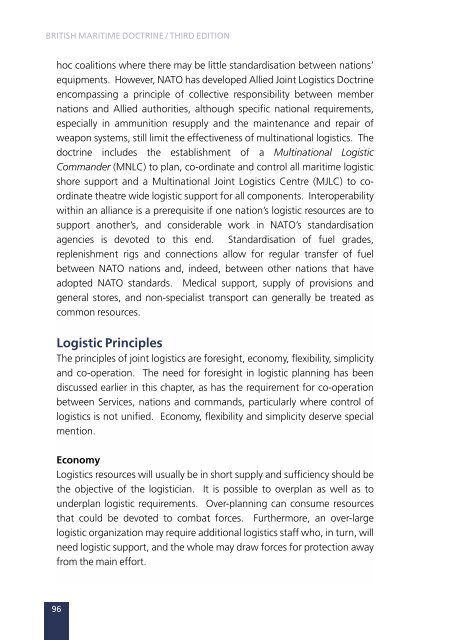Chapter 5 — Maritime Logistics and Support
Chapter 5 — Maritime Logistics and Support
Chapter 5 — Maritime Logistics and Support
Create successful ePaper yourself
Turn your PDF publications into a flip-book with our unique Google optimized e-Paper software.
BRITISH MARITIME DOCTRINE / THIRD EDITION<br />
hoc coalitions where there may be little st<strong>and</strong>ardisation between nations’<br />
equipments. However, NATO has developed Allied Joint <strong>Logistics</strong> Doctrine<br />
encompassing a principle of collective responsibility between member<br />
nations <strong>and</strong> Allied authorities, although specific national requirements,<br />
especially in ammunition resupply <strong>and</strong> the maintenance <strong>and</strong> repair of<br />
weapon systems, still limit the effectiveness of multinational logistics. The<br />
doctrine includes the establishment of a Multinational Logistic<br />
Comm<strong>and</strong>er (MNLC) to plan, co-ordinate <strong>and</strong> control all maritime logistic<br />
shore support <strong>and</strong> a Multinational Joint <strong>Logistics</strong> Centre (MJLC) to coordinate<br />
theatre wide logistic support for all components. Interoperability<br />
within an alliance is a prerequisite if one nation’s logistic resources are to<br />
support another’s, <strong>and</strong> considerable work in NATO’s st<strong>and</strong>ardisation<br />
agencies is devoted to this end. St<strong>and</strong>ardisation of fuel grades,<br />
replenishment rigs <strong>and</strong> connections allow for regular transfer of fuel<br />
between NATO nations <strong>and</strong>, indeed, between other nations that have<br />
adopted NATO st<strong>and</strong>ards. Medical support, supply of provisions <strong>and</strong><br />
general stores, <strong>and</strong> non-specialist transport can generally be treated as<br />
common resources.<br />
Logistic Principles<br />
The principles of joint logistics are foresight, economy, flexibility, simplicity<br />
<strong>and</strong> co-operation. The need for foresight in logistic planning has been<br />
discussed earlier in this chapter, as has the requirement for co-operation<br />
between Services, nations <strong>and</strong> comm<strong>and</strong>s, particularly where control of<br />
logistics is not unified. Economy, flexibility <strong>and</strong> simplicity deserve special<br />
mention.<br />
Economy<br />
<strong>Logistics</strong> resources will usually be in short supply <strong>and</strong> sufficiency should be<br />
the objective of the logistician. It is possible to overplan as well as to<br />
underplan logistic requirements. Over-planning can consume resources<br />
that could be devoted to combat forces. Furthermore, an over-large<br />
logistic organization may require additional logistics staff who, in turn, will<br />
need logistic support, <strong>and</strong> the whole may draw forces for protection away<br />
from the main effort.<br />
96

















